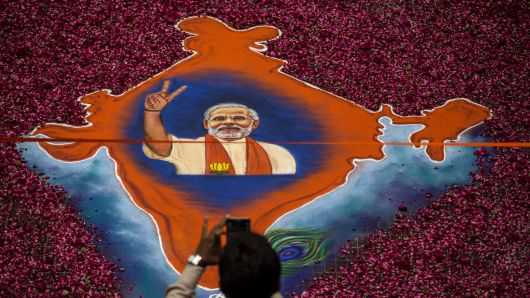America's closest Asian allies are all pushing for stronger ties — with India
28 October, 2018

A supporter takes a picture of a map of India made of flowers with a picture of BJP leader Narendra Modi on it at the party's headquarters.
As Washington and Beijing fight out their trade war, Asia's most developed countries are trying to reduce their dependence on China — and turn toward India.
Japan, South Korea, Taiwan and Australia — all close allies of the United States — are among the countries attempting to diversify their economies away from dependence on China, whose export-oriented industries are likely to be hurt by the trade war.
Many Asian countries produce goods that are assembled in China before being exported stateside, making the entire region's manufacturing chain vulnerable to U.S.-China trade tensions.
"Whereas in the past, India was coy about suggesting a larger regional role, today, India talks of itself (as) a leading global player." -Harsh Pant, distinguished fellow, Observer Research Foundation
Boosting trade within Asia is widely seen as the region's best safeguard, and that's pushing Japan, South Korea and Australia to pay more attention to its neighbors — particularly India, said Termsak Chalermpalanupap, lead researcher at ISEAS-Yusof Ishak Institute, a Singapore-based think tank.
The trade war means Asian countries "do not have the luxury of continuing with their traditional approach," said Harsh Pant, a distinguished fellow at Indian think tank, Observer Research Foundation. "They need other actors like India, which has been highlighting its credentials as a responsible security and economic partner."
'Key partner'
The Australian government announced an ambitious "India Economic Strategy" in July. By 2035, Australia hopes to make India one of its top three export markets and the third biggest Asian destination for outward investment.
Late last year, South Korean President Moon Jae-in introduced a blueprint known as the "Southern Policy" that's focused on deepening ties with Southeast Asia. India — despite not being geographically part of Southeast Asia — will be Seoul's "key partner for cooperation" on that front, Moon said during a visit to New Delhi in July.
Japanese Prime Minister Shinzo Abe, who is due to visit New Delhi next week, has committed to making India a pillar of his Indo-Pacific blueprint, which promotes infrastructure investment and development in Asian and African emerging markets. It was first announced in 2016, well before U.S. President Donald Trump started using the term.
The primary areas of cooperation between India and Japan are personal contacts, strengthened maritime ties and improved relations on defense and development, Japanese Ambassador to India Kenji Hiramatsu said at a briefing organized by Brookings India on Monday.
Taiwanese companies such as Foxconn, the world biggest contract manufacturer, have invested in India as part of President Tsai Ing-wen's New Southbound Policy, which was announced in 2016.
But can India take advantage?
From a political perspective, "the stars are aligning in Asia for the acceleration of India's economic growth," Dhruva Jaishankar, foreign policy fellow at Brookings India, wrote in a note this month.
"Beijing's use of its economic muscle for political purposes" could be another factor pushing countries toward India, he said. Jaishankar pointed to Beijing's suspension of rare earth metal exports to Japan amid a territorial dispute in 2010, and more recently, China's punishment of South Korean firms over a missile defense system.
It remains to be seen, however, whether New Delhi can benefit from all these trends.
On one hand, India's economic rise and Prime Minister Narendra Modi's energetic diplomacy make the country the ideal partner for Asian countries.
"Whereas in the past, India was coy about suggesting a larger regional role, today, India talks of itself (as) a leading global player," said the Observer Research Foundation's Pant.
But challenges lie ahead.
India will need to ramp up its economic and security engagement with other countries in the region, since China is far ahead on both fronts, Pant warned.
On top of that, amid the South Asian country's's legacy of poorly negotiated trade deals and uneven economic liberalization, "the likelihood of India taking full advantage of these opportunities remains slim," Jaishankar said.
